Major Events of 2017
NRC Live series on the Future of Healthcare
Oct
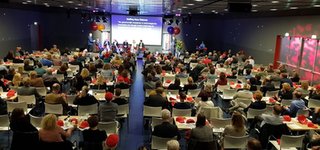
NRC Live series on the Future of Healthcare: lively debate closes the season
During the summer months, NRC Live organised a series of events on the Future of Healthcare. During these events questions like ‘What does the future of healthcare look like?’ or ‘How can we adapt to the increasing pressure of a sustainable healthcare system?’ were addressed during five informative and interactive evenings in the Jaarbeurs Utrecht. The themes of the first four events were: behaviour and health, technology as motor of innovation, organising in a smarter and better way, and new business models and finance. The fifth and final evening concluded these sessions with a large healthcare debate.
Get an impression on the final evening in the video below or visit the NRC Live website.
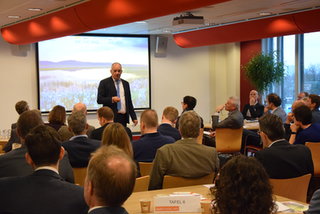
Evaluation of Innovation
Oct
Information meeting ‘Evaluation of Innovation’
New strategic public-private partnership to assess impact of healthcare innovations
On 5 December, Carl Moons, Director of Research at the Julius Center, and the Top Sector Life Sciences & Health (LSH) brought together many healthcare stakeholders to discuss and assess the impact (i.e. efficacy and cost-effectiveness, as well as implementation and adoption) of healthcare innovations. Healthcare is moving towards personalised medicine and self-management by the patient, and increasingly from tertiary and secondary to primary and preventive care. Medical innovations are a big driver of these changes, but pose a challenge with regard to their evaluation and implementation, and their inclusion in a sustainable and affordable healthcare system.
Erik Gerritsen, Secretary General of the Ministry of Health, Welfare and Sport, opened the day with a plea underlining the need to join forces and make decisions, not sit back and talk. Motivated and inspired, representatives from academia, knowledge centres, industry, healthcare providers, and governmental agencies debated about the best ways to evaluate which innovations have to reach the clinic. Valuable results will be gathered and, ultimately, lead to the development of an evaluation methodology that is fit for the specific type of innovation or product and acknowledged and applied by all stakeholders, including end users (patients and healthcare professionals). In 2018, elaborated work packages will be proposed to all initial attendees in a follow up meeting, aimed at building up a sustainable consortium for tackling current obstacles in implementation of innovations.
Interested in this new public-private partnership please feel free to contact Hanna Groen.
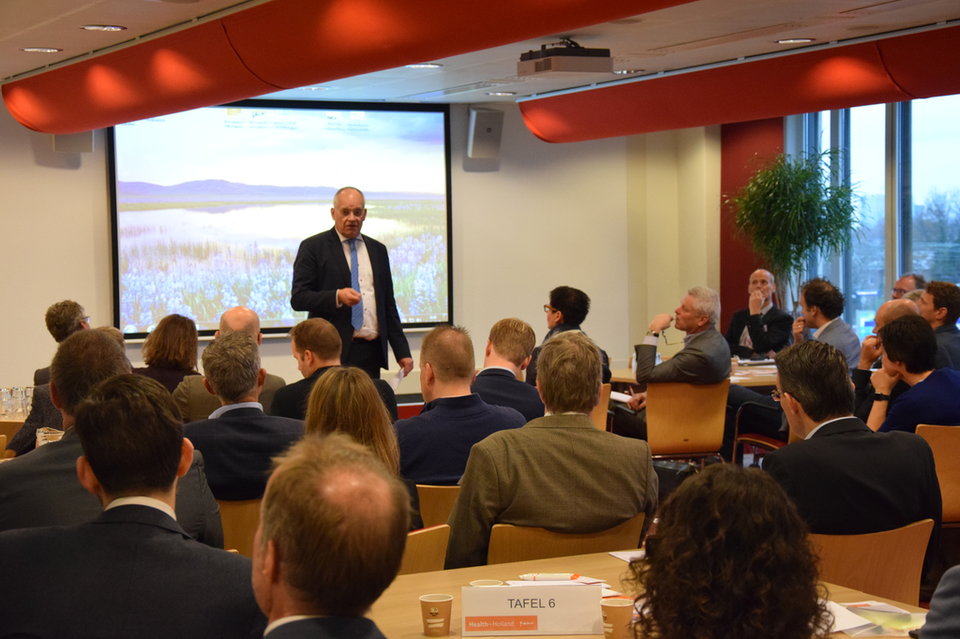
RegMed XB Global Launch
Oct

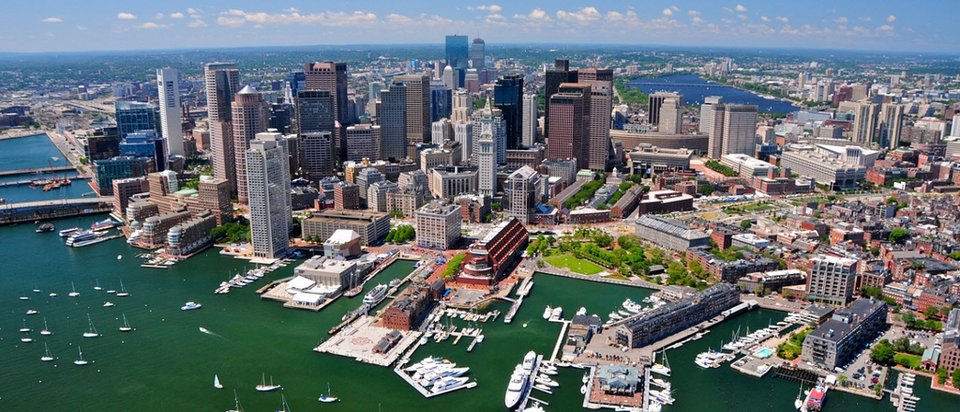
Global Launch of RegMed XB
Growth towards a 'worldwide-consortium' accelerates healing for the chronically ill
RegMed XB is working on new scaling up in Europe and the US
RegMed XB (Regenerative Medicine Crossing Borders) is an international public-private organisation that pursues solutions for patients with kidney failure, type 1 diabetes and osteoarthritis with a target research budget of 250 million euros. RegMed XB wants to accelerate the long road to healing and aims to create new, affordable health solutions. The Dutch-Flemish institute, which brings together the strengths of hundreds of top researchers, doctors and entrepreneurs, is therefore engaging in serious discussion in the USA. 24th and 25th of October they organised a conference-day in Boston specifically with American entrepreneurs, administrators and top researchers from among others Wyss, Harvard and California.
New industry
Research in the relatively young science of regenerative medicine is promising, but also time consuming and expensive. The researchers are convinced that in the next 10 years they will be able to take great steps towards healing kidney failure, type 1 diabetes and osteoarthritis. At the same time, an industry will have to develop that can produce the new complex techniques (including stem cell therapy) on a large scale. RegMed XB Director Prof. Marianne van der Steen: “Whether we will be able to go from care to cure depends on scaling up and development of this new industry for regenerative medicine. It will be able to bring the new health care solutions onto the market at an affordable price so that hundreds of millions of patients around the world can actually benefit from them. For widespread grassroots diseases, you don't want expensive medicines for the happy few. RegMed XB already has dozens of large and small businesses, but we are looking for more companies to join forces.”
Streamlined research
Researchers and doctors from the universities and university medical centres in Utrecht, Leiden, Eindhoven, Maastricht and Leuven are already working very closely together in RegMed XB. RegMed XB-founder Prof. Clemens van Blitterswijk: “In RegMed XB we use a business-like model. Each of the three current projects has a leader who works step-by-step on research objectives and directs researchers from other institutions. This is how you work efficiently and each party will get involved in this very versatile and complex research and solve his or her own piece of the puzzle. Time gain is in the interest of the patient.” Tom Oostrom, director of the Dutch Kidney Foundation -who is a party to RegMed XB with the Rheumatism Fund, Diabetes Research Netherlands and the Diabetes Foundation: “Unique about RegMed XB is that it puts the patient perspective first and works specifically on solutions for them. Patients with kidney failure, osteoarthritis or diabetes type 1 have the same syndrome all over the world. It would be a great boost if health foundations in other countries were to step into this promising project.”
New ecosystem with great opportunities
Van der Steen: “If we really want to accelerate consistently, more is needed. We will have to grow towards a new ecosystem for regenerative medicine: a community of closely cooperating industry, research institutions, governments, investors and patient organisations. These close links together form an integrated ecosystem that will be cross-borders. Complex investigations and long-term projects are involved, so new risk capital injections are constantly needed. In order to be able to achieve this in a responsible manner, these are international public-private consortia. Let us not forget that this system offers great opportunities: hundreds of millions of patients can heal and live longer; the cost of curing is lower than that of sustained care. In addition, a new industry is emerging which will also be of great economic importance. These are precisely the reasons why we are now talking about new scaling up in the United States.”
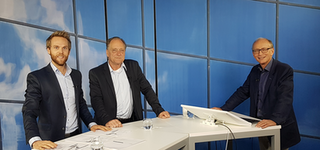
Health~Holland webinar: Internationalisation & Export
Oct
Watch the new Health~Holland webinar on Internationalisation & Export
Everything you always wanted to know about Internationalisation & Export (but were afraid to ask)
On Tuesday 31 October 2017, Top Sector Life Sciences & Health (LSH) hosted a webinar on the ins and outs of internationalisation and export. Maintaining health and vitality is a worldwide challenge, which provides companies with business opportunities at an international level. But how can you seize these opportunities? If you are (thinking of) going abroad and don’t know where to start then watch the webinar and learn some valuable lessons in just one hour!
Hans Schikan, seasoned biotech entrepreneur and member of the Top Team LSH, hosted this third webinar with the aim of supporting entrepreneurs in realising their international ambitions. Panel members Len de Jong, CEO Enraf-Nonius, and Peter Post, Managing Director Task Force Health Care, unravelled some secrets of taking your business across Dutch borders. During the webinar the panel members addressed the most common pitfalls, personal anecdotes and real-life examples based on their experience of helping more than 500 Dutch healthcare SMEs.
So, are you (thinking of) going abroad? Are your international sales stagnating? Or don’t you know where to start? Make sure you check out this new webinar from the Top Sector LSH. The webinar is an informative and accessible way of inspiring organisations with some export tips and tricks. The webinar is now available online via this online link (broadcast language: Dutch).

BIO-Europe Berlin
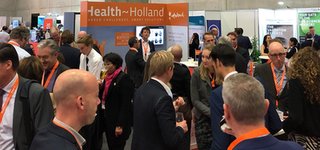
Nov
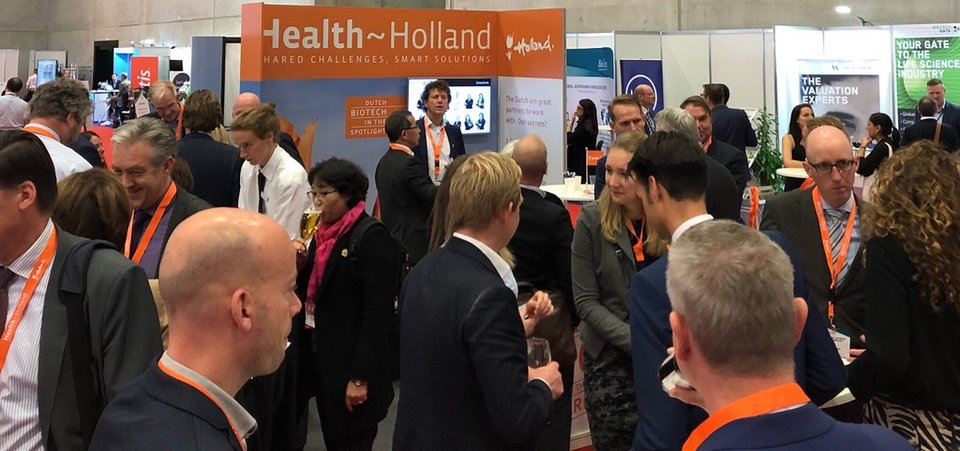
The Netherlands well represented at the BIO-Europe Berlin
More than 100 Dutch entrepreneurs joined Health~Holland in Berlin
This November the Netherlands hosted a small but crowdy Health~Holland Pavilion at the BIO-Europe in Berlin. This leading partnering event turned Berlin into a global biotech hotspot for a week. Thanks to the striking Health~Holland Pavilion and more than 100 Dutch participants who wore eye-catching orange key-cords, the Dutch presence did not go unnoticed. At the Pavilion, the Netherlands presented itself as an attractive country for establishing a biotech company, as an innovative business partner, and as a successful location for R&D.
At the “Biotech in the Spotlight Corner” divers Dutch companies got the chance to present themselves to the diverse audience. On Tuesday the Top Sector LSH and HollandBIO organised a well visited reception at the pavilion. And as always, the pavilion served as a living room away from home for all Dutch delegates. Next stop: BIO-Europe Spring 2018 in Amsterdam!
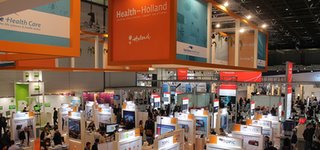
Medica
Nov
Exporting Dutch Smart Solutions at Medica
Meet the Dutch at the Health~Holland Pavilion
Once again, the world’s biggest medical trade fair Medica, which takes place in Düsseldorf, provided a perfect opportunity for the Dutch Life Sciences & Health sector to present itself. An outstanding Health~Holland pavilion added Dutch Smart Solutions to the well-visited event. With the ‘Meet the Dutch’ activities the pavilion attracted a large number of people again this year.
For each of the four days of the fair, from 13 to 16 November 2017, specialists from all sectors of the health industry ensured that the daily intake of visitors was consistently high at the Health~Holland Pavilion. This year, 29 Dutch organisations formed a prominent orange presence covering more than 300 m2 at the exhibition! In the presence of Secretary General Erik Gerritsen (Ministry of Health, Welfare & Sport) several pitch events and roundtable meetings gave the floor to Walloon, German and Dutch organisations. They pitches their smart solutions. Visitors to the Pavillion were inspired by exciting topics such as digitisation and value-based healthcare. Finding common ground in these topics helped visitors to share knowledge and investigate business opportunities between several nationalities.
Overall, Medica 2017 with our Health~Holland Pavilion and Meet the Dutch activities resulted in many new acquaintances, networking opportunities and future collaboration plans.
Erik Gerritsen described his visit to Medica as: “Very inspiring to be among so much positive energy from the Dutch ecosystem!”
The Task Force Health Care will organise the Health~Holland Pavilion at Medica in 2018.
Dutch Life Scienes conference
Nov
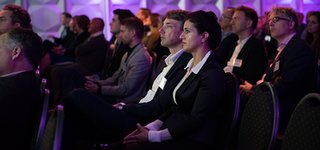
Dutch Life Sciences conference held at Pivot Park
To mark the 10th anniversary of Pivot Park (Oss), the 13th edition of the Dutch Life Sciences Conference (DLSC) took place at this science park on 22 November. At this annual event approximately 200 professionals working in the life sciences industry gathered together to hear more about topics such as medical food, drug delivery, and electronic and mobile healthcare. In the afternoon, participants could visit the Screening Centre in the heart of Pivot Park.
Inspiring biotech programme
After a warm welcome by director of Pivot Park and member of the Advisory Board of Top Sector Life Sciences & Health (LSH), Mirjam Mol, the day provided a varied programme for the participants. Just like every year the information market was the place to network and learn more about the exhibiting companies working in the Dutch biotech field. During plenary and parallel sessions there was plenty of opportunity to focus on specific R&D and business topics.
Highlights of Dutch regions
As main partner of the DLSC, Health~Holland wanted to provide a way to highlight the different life sciences regions: the Netherlands harbours. Together with the DLSC, a short movie has been developed with stories from throughout the country: from the Chemelot-InScite ecosystem in Limburg to the Healthy Aging Network in the Northern Netherlands. Life sciences regions and science parks are extremely important for the Dutch innovative character, but have to work together to be of interest internationally. Or as Edward van der Meer, Managing Director of the HANNN, puts it: “Through national collaboration this regional initiative will create worldwide impact”.
Watch the video and get inspired: Join the Dutch regions and discover more!
Start-up challenges
Biotech innovation is facilitated by new start-up initiatives. At the DLSC, start-ups can showcase their innovations. All six teams of the Venture Challenge Fall 2017 pitched their ventures to the public after which Chrétien Herben, director of the LifeSciences@Work Accelerator, announced Cyclomics as the winner. Cyclomics was awarded with 25,000 euros to develop their company further. Additionally, ten start-ups attended the investors' forum, where they discussed their business strategy, technology direction and capital-raising plan. Annemiek Verkamman, director of HollandBIO, announced Hemics as winner of the investors' forum. Hemics has developed a non-invasive, fast and objective method that supports rheumatologists in the quantification of inflammation, which is a key parameter in the treatment of rheumatoid arthritis. In total, it was great to see the innovative power of the Dutch Life Sciences organisations.
Next year the Dutch Life Sciences conference will be held in Leiden. Keep an eye on the website.
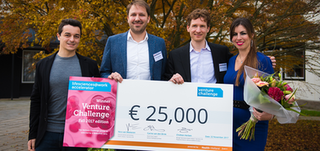
Cyclomics wins the Venture Challenge Fall
Nov
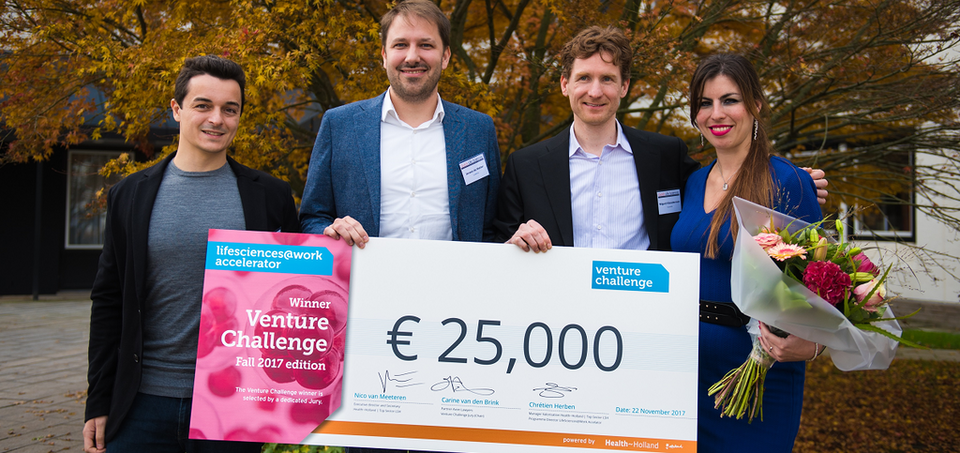
Cyclomics: Winner of the Venture Challenge Fall 2017
At the Dutch Life Sciences Conference 2017, Chrétien Herben, director of the LifeSciences@Work Accelerator, announced Cyclomics as winning team of the 18th edition of the Venture Challenge. The start-up Cyclomics has developed a technology to measure cancer recurrence in liquid biopsies, by detection of cancer mutations in blood at single-molecule sensitivity. This way the start-up aims to improve the survival rate for many different types of cancer.
According to the Venture Challenge jury the technological innovation of Cyclomics addresses worldwide challenges in the field of early cancer diagnosis. The team presented this high potential technology via an excellent venture plan and Q&A.
Each year millions of people die from cancer, often due to recurrent disease. To prevent recurrent cancer from becoming untreatable it should be detected as early as possible. The technology of Cyclomics addresses this burning clinical need by offering detection of cancer mutations in blood at single-molecule sensitivity, which is not reached by any other liquid biopsy test on the market. Moreover, Cyclomics provides a comprehensive test as it can detect mutations in complete genes or gene panels, ensuring secondary tumors or newly emerging tumor clones are not missed. This technology can become the first cancer diagnostic test that can be combined with portable third-generation sequencing, providing low-cost access to any diagnostic laboratory worldwide.
"Our ambition is to market our Cyclomics technology for different indications and target groups, starting with the diagnosis of head-and-neck cancer. In this way we hope to improve survival of many cancer patients worldwide," states Wigard Kloosterman, Principal Investigator, cancer genomics, University Medical Center Utrecht.
The Venture Challenge Fall 2017 started in September this year and came to an end during the Dutch Life Sciences Conference 2017 in Oss. Other participating teams were UPyTher, Breath Medics, Excoris, MarkMyGenes and PlatformFive. Participating in the Venture Challenge leads to clear venture plans, as well as to very well-prepared and presented pitches. The LifeSciences@Work Accelerator is powered by Health~Holland, Top Sector Life Sciences & Health.
Contact Wigard Kloosterman for more information about Cyclomics.
New Call open: join the Venture Challenge Spring 2018!
Our specialised coaching focuses on developing your initial idea into a solid business case during an entrepreneurial approach with boot camps, 1-on-1 coaching and mentoring. Startup teams learn to identify key risks, analyse customer value propositions, develop a validation strategy, learn to build a venture plan and learn how to get connected. Read more at the LifeSciences@Work website. Application deadline: 5 March 2018.
Meeting Report Health-RI
Dec
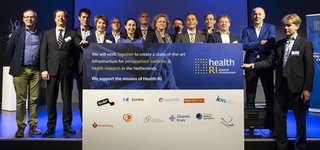
Meeting Report Health-RI 2017
From plans to actions
On 8 December 2017, the Jaarbeurs in Utrecht hosted the third Health-RI conference. Health-RI co-chair Ronald Stolk (UMCG, RUG): “There were more than 350 registrations, so the number of participants has increased substantially compared to last year. This reflects the timeliness of the initiative. In contrast to the previous two conferences, Health-RI was now able to show plenty of concrete examples of what Health-RI can do for researchers.”
The national Health-RI initiative aims to establish an interconnected infrastructure for Dutch personalised health research. The initiative is endorsed by more than 70 organisations, including research institutions, patient organisations, companies, governmental organisations, and research funders. Health-RI co-chair Gerrit Meijer (Netherlands Cancer Institute): “A lot of great health research is being done, but it is a challenge to bring the results to patients and improve healthcare. This innovation gap is caused by fragmentation of data, sample collections, image collections, and more. Health-RI can provide the solution to this problem.” Meijer presented the Health-RI business plan at the conference.
Business plan
The Health-RI business plan is an ambitious yet realistic plan to assemble all stakeholders and create a sustainable infrastructure that will facilitate world-class personalised health research in the Netherlands. It will build on existing infrastructures and attract new partners. In 2018, the current temporary governance will evolve into a permanent governance as described in the plan. Meijer: “Importantly, Health-RI governance will be inclusive, i.e., all ten chambers of stakeholders will be present in the general assembly and each chamber appoints a representative in the strategic committee. Building on the current strength of public-private partnership research in the Netherlands, Health-RI will bring together the best of the country’s expertise and resources for open-science health research. It will make these accessible to researchers by connecting activities and shared services, and it will act as a collective national and international voice for the sector.” To conclude the session, several Health-RI partners introduced themselves and symbolically placed a building block on a Health-RI wall, amongst them Top Sector Life Sciences & Health.
Concrete examples
Many Health-RI partners offer services and resources to support researchers. Martijntje Bakker (ZonMw): “However, it is very complex for researchers to find their way to such research infrastructure, for instance to find out how to gain access. Health-RI can help to improve this.” An overview of several key services and resources is already available on the Health-RI website.
Photography: Thijs Rooimans











